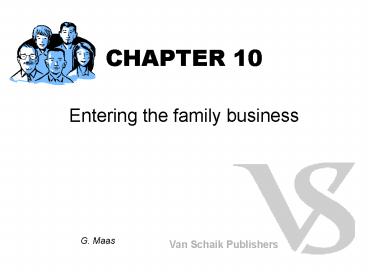Entering the family business - PowerPoint PPT Presentation
1 / 19
Title:
Entering the family business
Description:
Inability to balance family's needs for liquidity and ... Favouritism leads to nepotism. Expectations are not clarified. Family conflicts are not addressed ... – PowerPoint PPT presentation
Number of Views:25
Avg rating:3.0/5.0
Title: Entering the family business
1
Entering the family business
CHAPTER 10
G. Maas
2
IMPORTANCE
- Western Europe 40-65 of GNP
- America 40-60 of GNP
- Mostly SMMEs
- Job creation
- Social stability
3
WHAT IS A FAMILY BUSINESS?
- A business that is influenced by a family
- Bridging more than one generation
- To realize vision of family
4
SYSTEMS IN FAMILY BUSINESS
5
COMPLEXITY OF A FAMILY BUSINESS
Different roles 1. Family members 2. Non-family
investors 3. Non-family employees 4. Family
shareholders 5. Non-family working owners 6.
Working family members 7. Working family
owners 8. Family owners and business leaders
6
COMPLEXITY OF A FAMILY BUSINESS
7
PROBLEMS
- Only 30 to second generation
- Only 10 to third generation
- Average life span 24 year
- Bankruptcy
- Entrepreneurship
- No structure
8
REASONS FOR PROBLEMS
- No capital for growth
- Inability to balance familys needs for liquidity
and businesss need for cash - Poor estate planning
- Older members cannot let go of ownership
- Cannot attract and retain competent/motivated
successors - Sibling rivalry over succession
- Cannot attract senior non-family professional
managers - Conflict between cultures of the family, board
and the business
9
SA PROBLEMS
- Favouritism leads to nepotism
- Expectations are not clarified
- Family conflicts are not addressed
- Lack of entrepreneurial initiatives (stable
environment and lack of training) - Divorce
- Emigration
10
MAINTAINING A SUCCESSFUL FAMILY BUSINESS
- Succession
- Advisory boards
- Family councils
11
BARRIERS TO SUCCESSION
- Founder is autocratic
- A denial of mortality
- Child-stays-child scenario
- Leader misinterprets environmental trends and
does not implement changes in time - Inability to choose successor
- Leader selects successor to be slave
- A bias against planning - manage by seat of
their pants - Inability to face retirement
12
FOUR EXIT STYLES
- Monarch do not leave office until death or
palace revolt - Generals forced out but plot their return to
save business - Ambassador leave gracefully and frequently act
as post-retirement mentor - Governors rule for limited time and then switch
to something else
13
OPTIONS FOR SUCCESSION
- Appoint a family member
- Appoint a caretaker manager
- Appoint a professional manager
- Liquidate the business
- Sell, in whole or in part
- Do nothing
14
CRITICAL STEPS FOR SUCCESSION
- 1. Define what the owners and family want to
happen, now and in the future. - 2. Evaluate and test succession goals for
feasibility and compatibility. - 3. Develop a primary succession plan.
- 4. Communicate, modify and improve the plan
(acceptance from all family members) - 5. Implement plan
15
ROLE OF THE ADVISORY BOARD
- Ensure strategic alignment of business to major
industry trends - Keep business entrepreneurial by exploiting
opportunities - Manage conflicts timeously
- Ensure that decisions are based on fact, not
emotions - Ensure that decisions are in line with the family
value system
16
COMPOSITION OF COUNCIL
- The board should consist of family members,
non-family members and external specialists - Regular meetings are held during the year
- Board meetings should be seen as a formal
occasion - Service providers are not necessarily part of the
advisory board because they are already involved - Do not involve friends
- Only family members with an ownership claim
should be included
17
FAMILY COUNCIL
- Oversees family-specific matters
- Familys philosophy
- Succession planning
- Employment criteria
- Involvement in the business
- Response to the external environment
18
FAMILY CREED
- A family creed is a statement of intent that
spells out the familys values and its policies
in relation to the business. It reflects what
the family stands for and should be supported by
all family members.
19
FAMILY CREED
Process questions can be used to facilitate the
creation of a family creed.
- Questions can be asked regarding
- Management philosophy and objectives
- Jobs for family members and remuneration
- Leadership
- Shareholding
- Board of directors or advisory board
- Communication
- Employees
- Changes in the family constitution































